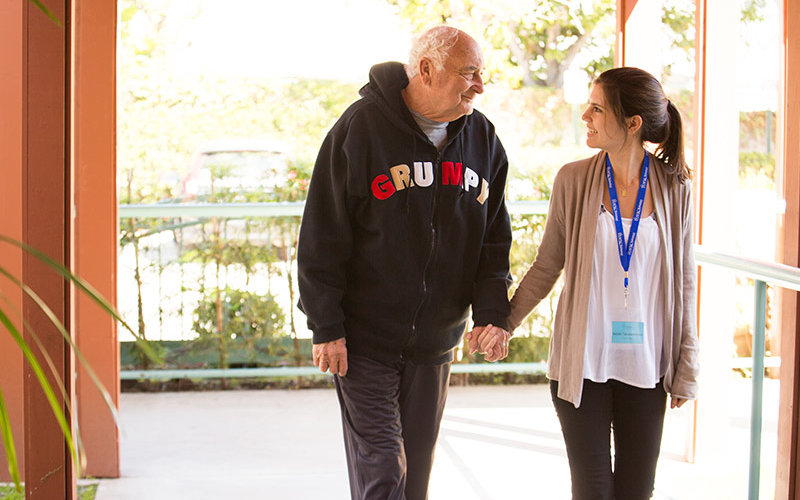
To put a human face on Alzheimer’s disease and other dementias, a Cal State Fullerton gerontology class is taking students inside a local care facility that serves approximately 100 patients with dementia every day.
In “Aging and Dementia,” students spend five weeks in the classroom learning the fundamentals of the disease, five weeks gaining hands-on experiences at the Alzheimer’s Family Center in Huntington Beach, and five weeks reflecting on their experiences and discussing long-term implications.
The goal? To ready the next generation of professionals for a looming health care crisis. According to the Alzheimer’s Association 2018 Facts and Figures, more than 5 million Americans are living with Alzheimer’s, a number expected to reach nearly 14 million by 2050.
“The Alzheimer’s epidemic is a health care crisis both in Orange County and on a national level,” says Cheryl Alvarez, lecturer in gerontology and course instructor, who also serves as director of outpatient behavioral health for the Alzheimer’s Family Center and program director for the Mind and Memory Program at Mission Hospital. She says the partnership between the center and the university is an effort to better integrate dementia education into students’ curriculum and provide applied learning experiences.
“Students often don’t have a lot of experience with dementia patients because there are limited opportunities and because it’s scary for a lot of people,” says Alvarez. “We want to help students learn what to expect and see that working with this population can be really rewarding.”
During their 40 hours of service-learning, students assist dementia patients with physical and occupational therapy, lead anxiety-reducing exercises, coordinate activities such as art and bingo, and observe nurses performing medical oversight.
“I think patients really like the interaction with students,” observes Alvarez. “They love the one-on-one, individual attention, especially opportunities to share their stories.”
Students also learn such strategies as “redirecting patients” so they feel safe and validated and “therapeutic fibbing” to meet patients in their own realities.
“A patient who traveled frequently during their working years may have a delusion that they are at the airport waiting for a flight. Instead of arguing with them, we might respond with, ‘Can I get you a glass of water while you’re waiting?'” explains Alvarez. “Our goal is to create happy, healthy days for our patients and to help them maintain their quality of life for as long as possible.”
Sarah Schoniger, a psychology major minoring in gerontology, says she was “immediately drawn to the course” because it gives students an opportunity to apply the knowledge they have learned in class and to work closely with the dementia population.
With plans to pursue a career in geriatric counseling or a related field, Schoniger shares, “This experience reaffirms to me that every person, regardless of their diagnosis, should be treated with the same dignity and respect as anyone else.”
The experience also reminds Schoniger that patience is key to working with this population. “You have to accept that you will be working at the patients’ speed and on their terms, not your own,” she says.
Supervising the students’ service-learning is Patrick Wallis ’08, ’13 (B.A. sociology, M.S. gerontology), manager of activities at the Alzheimer’s Family Center. The Titan alumnus, who became an advocate for the population when his own grandmother was misdiagnosed with Alzheimer’s, credits his alma mater for preparing him to work in the field.
“I spent a lot of my time in my graduate program with very prominent figures within the aging community, many of whom have become lifelong mentors to me,” says Wallis. “My education from CSUF has been paramount to my advocacy.”
Wallis says that the development of a highly trained workforce to care for the aging population is “imperative in preparing for the ‘silver tsunami’ that is about to devastate this country and our health care system.” He adds, “It is not possible to develop a quality and cost-effective delivery system without an educated workforce that understands how to deliver care to older adults.”
Working to recruit more students to the field, Alvarez emphasizes that everyone is likely to have people in their lives affected by aging-related diseases.
“I hope students will learn compassion for humans who have a neurodegenerative disease that’s no fault of their own,” says Alvarez. “I also hope they’ll gain the desire to work with this population, rather than avoid it, because the field is so underserved.”